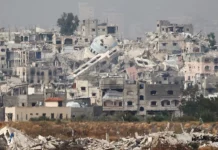DM Monitoring
ABUJA: If you listen to the African leaders addressing the U.N. General Assembly this year, the message is emphatic and unanimous: The continent is done being a victim of a post-World War II order. It is a global power in itself and must be partnered with — not sidelined.
Most of Africa has logged a lifetime of independence — roughly 60 years — and the continent of more than 1.3 billion people is more conscious of the challenges stifling its development. There’s also a new boldness that comes with the African Union’s G20 seat.
“We as Africa have come to the world, not to ask for alms, charity or handouts, but to work with the rest of the global community and give every human being in this world a decent chance of security and prosperity,” Kenyan President William Ruto said. In recent years, Africa has been clear about its capacity to become a global power, from efforts to tackle climate change at home — such as the existential threat of climate change upending lives and livelihoods in the region, despite Africa contributing by far the least to global warming — to helping to foster peace elsewhere, like in Russia and Ukraine.
In his address, Ghana’s President Nana Akufo-Addo blamed Africa’s present-day challenges on “historical injustices” and called for reparations for the slave trade. President Cyril Ramaphosa of South Africa said the continent is poised to “regain its position as a site of human progress” despite dealing with a “legacy of exploitation and subjugation.” Nigeria’s leader, Bola Tinubu, urged his peers to see the region not as “a problem to be avoided” but as “true friends and partners.”
“Africa is nothing less than the key to the world’s future,” said Tinubu, who leads a country that, by 2050, is forecast to become the third most populous in the world.
With the largest bloc of countries at the United Nations, it is understandable that African leaders increasingly demand a bigger voice in multilateral institutions, said Murithi Mutiga, program director for Africa at the Crisis Group. “Those calls will grow especially at a time when the continent is being courted by big powers amid growing geopolitical competition.”
On the U.N.’s sidelines, the African Development Bank mobilized some political and business leaders at an event tagged “Unstoppable Africa,” a phrase seen as reflective of the continent’s aspirations just days after the first-ever Africa Climate Summit called richer countries to keep their climate promises — and invest.
But with a young population set to double by 2050, Africa is the only rapidly growing region where its people are getting poorer and where some are celebrating the rampant takeover of their democratically elected governments by militaries.
“Africa is a paradox,” said Rashid Abdi, Horn of Africa/Gulf chief analyst at the Nairobi-based Sahan Research think tank. “It is not just a continent of dwindling hope, there are parts of Africa where we are seeing innovation, progressive thinking and very smart solutions.”




